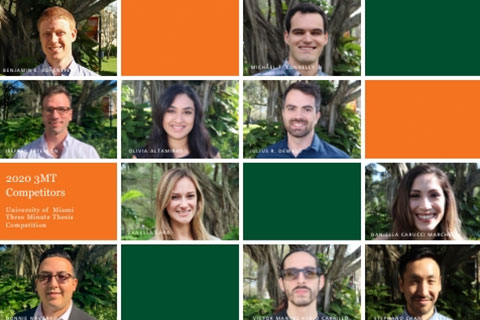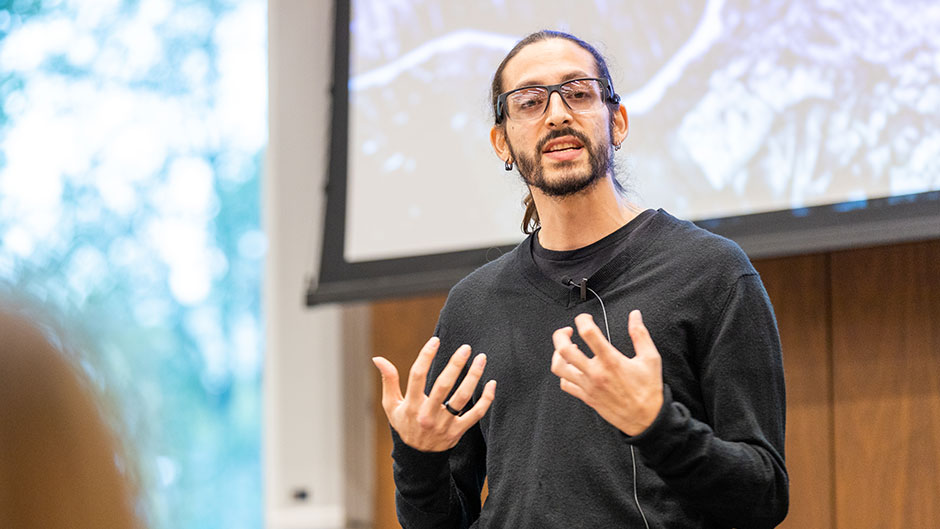When Víctor Manuel Rubio Carrillo learned how to use breathing techniques to perfect his singing, he began to wonder how else he could apply these new skills.
Years later, while playing classical guitar, Rubio Carrillo decided to use the same musical breathing techniques, and noticed it improved his playing quite a bit.
So, recently, for his thesis in music education, Rubio Carrillo, a University of Miami Ph.D. student, put his hypothesis to work. He taught half of the classical guitar majors at the Frost School of Music how to use the breathing techniques, and then tested them to see if their playing improved. It did, but Rubio Carrillo also noticed that by using these breathing techniques, the musicians’ overall mental health improved, too.
“What was surprising was the difference in results of mental well-being, which were the most powerful,” said Rubio Carrillo, who can play more than 25 instruments. “This started as a way to improve guitar performance, but it led us to see how musical physiology can enhance overall wellness.”
Rubio Carrillo is now working on a second study to determine what part of a person’s well-being is enriched the most when musical breathing techniques are used. He is just one of 10 graduate students who will be presenting research on Wednesday, Feb. 5, in the Otto G. Richter Library’s Kislak Center for the fourth annual Three Minute Thesis Competition, hosted by the Graduate School. The competition tasks students with distilling what is often years of research into a quick three-minute summary, aided by just one PowerPoint slide. The winner, runner-up, and people’s choice will receive a cash prize, and the winner will participate in a statewide competition in April, said Laura Lopez Ramos, programs manager for the Graduate School.
But, the goal of the event is not simply to win. Instead, it’s a chance for students to bolster their confidence in speaking about their work and it’s an opportunity to meet other scholars from across the University that they may be able to collaborate with in the future, said Tatiana Perrino, associate dean of the Graduate School.
“By showcasing their work in [this competition], students can disseminate their findings to a broader audience than many are used to,” Perrino said. “Moreover, the intensive work of preparing for 3MT involves writing concisely, preparing compelling visualizations, and speaking effectively in public. These are fundamental professional skills that will serve these students well throughout their careers.” 
Another participant in the competition, Daniella Carucci Marchetti, a Ph.D. candidate in psychology, studies how school environmental factors can affect the health of students. Carucci’s research team surveyed 32 public high schools in Miami and focused on the body mass index (BMI) of 12,500 students.
“Adolescence is really when we develop our health behaviors, so it’s a critical period for health,” said Carucci, who plans to become a health psychologist. “I looked at how school factors influence adolescent weight above and beyond their diet, physical activity, gender, ethnicity, and time spent in front of a screen.”
Her results show that students attending higher socioeconomic schools, with better resources, also had students with a healthier BMI, Carucci said. Unfortunately, in Florida, this means schools in areas with more valuable homes automatically get more resources than schools located in areas with lower property values.
“The bottom line is that school does have an influence on weight, so attention should be given to these systemic and structural aspects about a child’s day,” she said. “Public schools should have a more equitable division of resources because every child should have access to a healthy learning environment. But right now we have these economic disparities among schools and that can influence a child’s health.”
Michael Connelly, a graduate student at the Rosenstiel School of Marine and Atmospheric Science, will share his research about how certain bacteria found in only some corals can help sustain reef colonies against rising ocean temperatures. In addition, Miller School of Medicine Ph.D. candidate Stephano Chang will explain his research on a new strategy to help victims of spinal cord injuries regain movement by enhancing the strength of the few surviving nerve cells.
To read more about each of the 10 competitors and their research, visit the Graduate School’s website.

